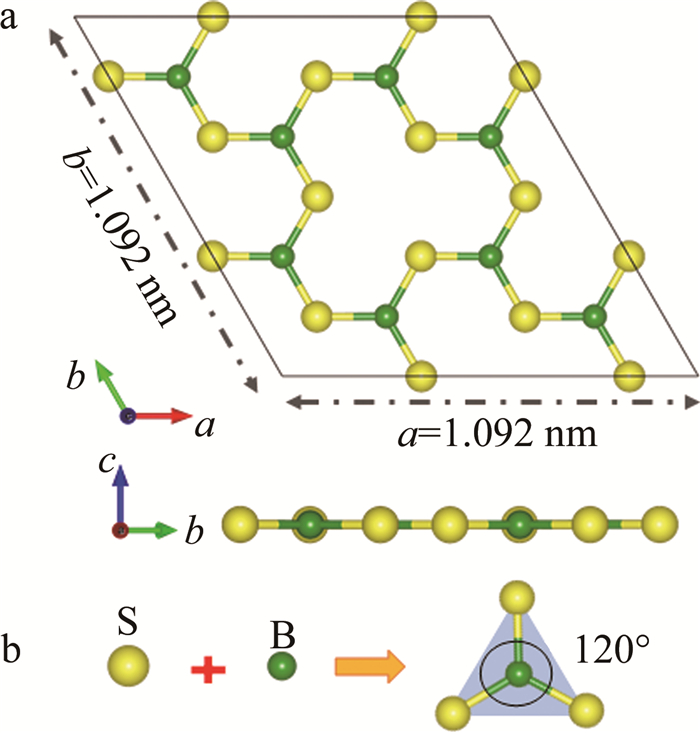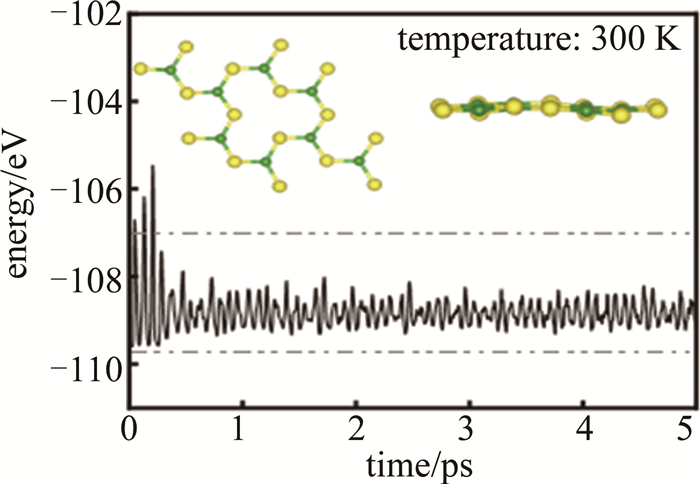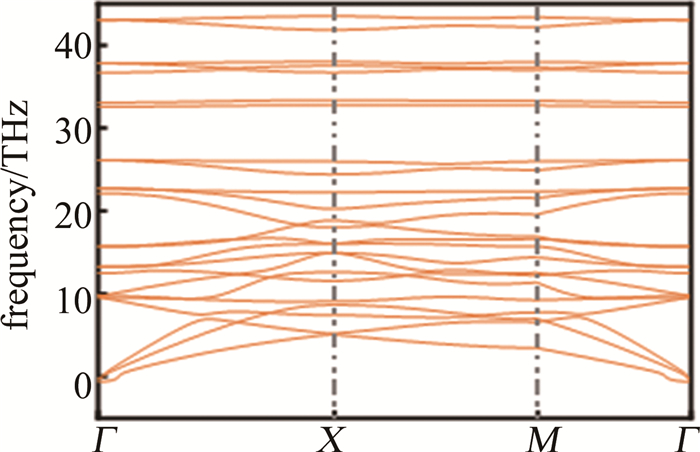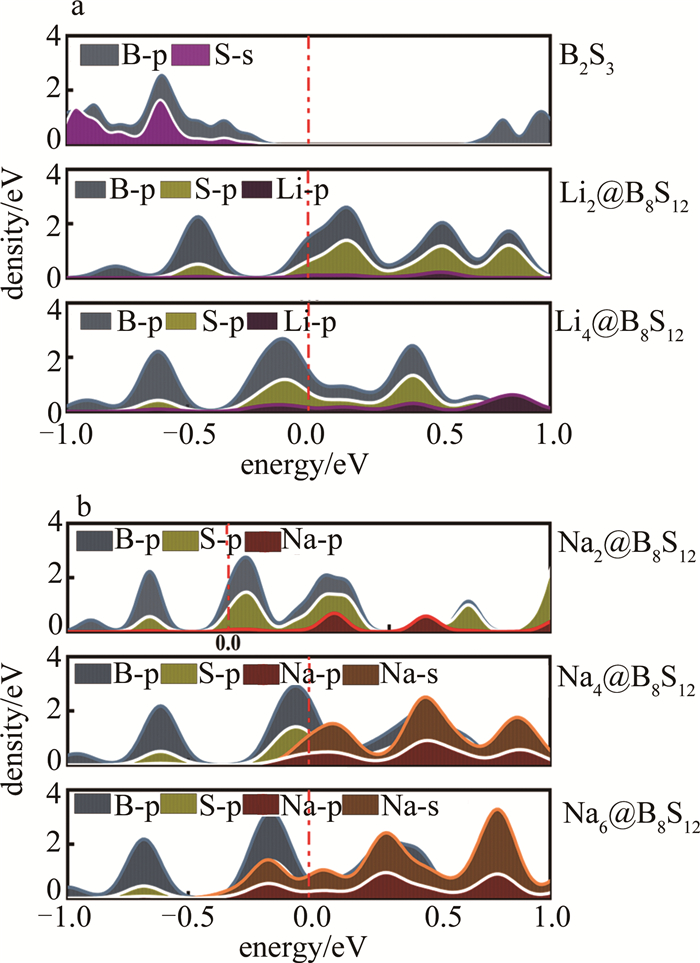Research on application properties of semiconductor optoelectronic material B2S3 in ion battery
-
摘要: 为了满足新型可再生能源技术对电极材料具有合适的结构、电子和机械性能的要求, 采用第一性原理, 计算研究了具有动态、机械和热稳定性B2S3半导体光电材料的电化学性能及其潜在应用。结果表明, 作为阳极材料,B2S3单层具有合适的存储容量(Li: 227.2 mAh/g;Na: 340.8 mAh/g)、超低扩散势垒(Li: 0.23 eV;Na: 0.14 eV)和低平均开路电压(Li: 0.515 eV;Na: 0.162 eV),在充放电过程中具有相对较小的晶格变化(Li: 2.5%;Na: 2.1%);在不同浓度的锂/钠离子吸附下,B2S3单层的金属特性保持不变,具有良好的导电性和电池运行稳定性,表明B2S3半导体光电材料是一种有吸引力的锂/钠离子电池阳极候选材料。B2S3单层的优异特性可促使进一步探索其作为锂/钠离子电池阳极材料的应用。Abstract: In order to meet the requirements of new renewable energy technologies for electrode materials with appropriate structural, electronic, and mechanical properties, first principles calculations were used to study the electrochemical properties and potential applications of B2S3 semiconductor optoelectronic materials with dynamic, mechanical, and thermal stability. The research results indicate that as an anode material, B2S3 monolayer has suitable storage capacity (Li: 227.2 mAh/g; Na: 340.8 mAh/g), ultra-low diffusion barrier (Li: 0.23 eV; Na: 0.14 eV), and low average open circuit voltage (Li: 0.515 eV; Na: 0.162 eV). It has relatively small lattice changes (Li: 2.5%; Na: 2.1%) during charge and discharge processes. Under different concentrations of lithium/sodium ion adsorption, the metal properties of B2S3 monolayer remain unchanged, exhibiting good conductivity and battery stability. This study indicates that B2S3 semiconductor optoelectronic material is an attractive anode candidate material for lithium/sodium ion batteries. The excellent properties of B2S3 monolayer can further explore its application as an anode material for lithium/sodium ion batteries.
-
Keywords:
- materials /
- Li/Na ion batteries /
- density functional theory /
- B2S3
-
-
表 1 锂/钠离子对B2S3表面的吸附位置、吸附能、电荷转移量和吸附高度
Table 1 Adsorption position, adsorption energy, charge transfer amount, and adsorption height of Li/Na ions on the B2S3 surface
metal adsorption position adsorption evergy/eV charge transfer amount|e| adsorption height/nm Li H1 -0.7 0.82 0.135 H2 -0.58 0.86 0.144 Na H1 -0.48 0.84 0.125 H2 -0.27 0.83 0.129 TB -0.11 0.88 0.142 -
[1] GEIM A K, NOVOSELOV K S. The rise and rise of graphene[J]. Nature Nanotechnology, 2007, 6(3): 183-191.
[2] JANA S, THOMAS S, LEE C H, et al. B3S monolayer: Prediction of a high-performance anode material for lithium-ion batteries[J]. Journal of Materials Chemistry, 2019, A7(20): 12706-12712.
[3] ZHANG Y B, ZHOU M, YANG M Y, et al. Experimental realization and computational investigations of B2S2 as a new 2D material with potential applications[J]. ACS Applied Materials & Interfaces, 2022, 14(28): 32330-32340.
[4] KANSARA S, KANG H Y, RYU S J, et al. Basic guidelines of first-principles calculations for suitable selection of electrochemical Li storage materials: A review[J]. Journal of Materials Chemistry, 2023, A11(45): 24482-24518.
[5] 孙浩, 徐建明, 张宏超, 等. 连续激光辐照三结GaAs太阳电池温度场仿真[J]. 激光技术, 2018, 42(2): 239-244. DOI: 10.7510/jgjs.issn.1001-3806.2018.02.019 SUN H, XU J M, ZHANG H Ch, et al. Simulation of temperature field of continuous laser irradiation three-junction GaAs solar cell[J]. Laser technology, 2018, 42(2): 239-244 (in Chinese). DOI: 10.7510/jgjs.issn.1001-3806.2018.02.019
[6] 杨欢, 陆健, 周大勇, 等. 1070 nm连续激光辐照三结GaAs太阳电池的实验研究[J]. 激光技术, 2017, 41(3): 318-321. DOI: 10.7510/jgjs.issn.1001-3806.2017.03.003 YANG H, LU J, ZHOU D Y, et al. Experimental study of 1070 nm continuous laser irradiation of three-junction GaAs solar cells[J]. Laser Technology, 2017, 41(3): 318-321(in Chinese). DOI: 10.7510/jgjs.issn.1001-3806.2017.03.003
[7] 谭宇, 陆健. 连续激光辐照三结GaAs太阳电池热应力场研究[J]. 激光技术, 2020, 44(2): 250-254. DOI: 10.7510/jgjs.issn.1001-3806.2020.02.020 TAN Y, LU J. Study on thermal stress field of three-junction GaAs solar cells irradiated by continuous laser[J]. Laser Technology, 2020, 44(2): 250-254(in Chinese). DOI: 10.7510/jgjs.issn.1001-3806.2020.02.020
[8] 江达飞, 方晓敏, 廖东进. 双光栅结构薄膜太阳能电池的优化[J]. 激光技术, 2019, 43(6): 850-854. DOI: 10.7510/jgjs.issn.1001-3806.2019.06.022 JIANG D F, FANG X M, LIAO D J. Optimization of thin film solar cells with double grating structure[J]. Laser Technology, 2019, 43(6): 850-854 (in Chinese). DOI: 10.7510/jgjs.issn.1001-3806.2019.06.022
[9] BHANDARI A, PENG Ch, DZIEDZIC J, et al. Li nucleation on the graphite anode under potential control in Li-ion batteries[J]. Journal of Materials Chemistry, 2022, A10(21): 11426-11436.
[10] HE X J, TANG A W, LI Y, et al. Theoretical studies of SiC van der Waals heterostructures as anodes of Li-ion batteries[J]. Applied Surface Science, 2021, 563(3): 150269.
[11] JANA S, THOMAS S, LEE C H, et al. Rational design of a PC3 monolayer: A high-capacity, rapidly charging anode material for sodium-ion batteries[J]. Carbon, 2020, 157: 420-426. DOI: 10.1016/j.carbon.2019.10.086
[12] YU X H, CHEN X H, WANG X, et al. Metallic B2C monolayer as a promising anode material for Li/Na ion storage[J]. Chemical Engineering Journal, 2021, 406: 126812. DOI: 10.1016/j.cej.2020.126812
[13] YUAN G H, BO T, QI X, et al. Monolayer Zr2B2: A promising two-dimensional anode material for Li-ion batteries[J]. Applied Surface Science, 2019, 480: 448-453. DOI: 10.1016/j.apsusc.2019.02.222
[14] EFTELTHARI A. Molybdenum diselenide (MoSe2) for energy storage, catalysis, and optoelectronics[J]. Applied Materials Today, 2017, 8: 1-17. DOI: 10.1016/j.apmt.2017.01.006
[15] VAALMA C, BUCHHOLZ D, WEIL M, et al. A cost and resource analysis of sodium-ion batteries[J]. Nature Reviews Materials, 2018, 3(4): 1-11.
[16] WANG Zh H, ZHOU X F, ZHANG X M, et al. Phagraphene: A low-energy graphene allotrope composed of 5-6-7 carbon rings with distorted Dirac cones[J]. Nano Letters, 2015, 15(9): 6182-6186. DOI: 10.1021/acs.nanolett.5b02512
[17] XU L Ch, WANG R Zh, MIAO M Sh, et al. Two dimensional Dirac carbon allotropes from graphene[J]. Nanoscale, 2014, 6(2): 1113-1118. DOI: 10.1039/C3NR04463G
[18] LI X B, XIE Sh Y, ZHENG H, et al. Boron based two-dimensional crystals: Theoretical design, realization proposal and applications[J]. Nanoscale, 2015, 7(45): 18863-18871. DOI: 10.1039/C5NR04359J
[19] ZHANG Zh H, YANG Y, GAO G Y, et al. Two-dimensional boron monolayers mediated by metal substrates[J]. Angewandte Chemie-International Edition, 2015, 54(44): 13214-13218.
[20] LALMI B, OUGHADDOU H, ENRIQUEZ H, et al. Epitaxial growth of a silicene sheet[J]. Applied Physics Letters, 2010, 97(22): 223109. DOI: 10.1063/1.3524215
[21] DAVILA M, XIAN L, CAHANGIROV S, et al. Germanene: A novel two-dimensional germanium allotrope akin to graphene and silicene[J]. New Journal of Physics, 2014, 16(9): 095002. DOI: 10.1088/1367-2630/16/9/095002
[22] XU Y, YAN B H, ZHANG H J, et al. Large-gap quantum spin hall insulators in tin films[J]. Physical Review Letters, 2013, 111(13): 136804. DOI: 10.1103/PhysRevLett.111.136804
[23] TAN Ch, JI G L. Semi-supervised incremental feature extraction algorithm for large-scale data stream[J]. Concurrency & Computation Practice & Experience, 2017, 29(6): e3914.
[24] TAO H C, GAO Y N, TALREJA N, et al. Two-dimensional nanosheets for electrocatalysis in energy generation and conversion[J]. Journal of Materials Chemistry, 2017, A5(16): 7257-7284.
[25] BHATNAGAR M, GARDELLA M, GIORDANO M C, et al. Broadband and tunable light harvesting in nanorippled MoS2 ultrathin films[J]. ACS Applied Materials & Interfaces, 2021, 13(11): 13508-13516.
[26] DING W, HU L, DAI J M, et al. Highly ambient-stable 1T-MoS2 and 1T-WS2 by hydrothermal synthesis under high magnetic fields[J]. ACS Nano, 2019, 13(2): 1694-1702.
[27] DOLAI S, MAITI P, GHORAI A, et al. Exfoliated molybdenum disulfide-wrapped CdS nanoparticles as a nano-heterojunction for photo-electrochemical water splitting[J]. ACS Applied Materials & Interfaces, 2021, 13(1): 438-448.
[28] WANG G Zh, ZHI Y, BO M L, et al. 2D hexagonal boron nitride/cadmium sulfide heterostructure as a promising water-splitting photocatalyst[J]. Physica Status Solidi B: Basic Solid State Physics, 2020, 257(1): 1900431.
[29] CHEREDNICHENKO K A, MUKHANOV V A, WANG Zh H, et al. Discovery of new boron-rich chalcogenides: Orthorhombic B6X (X=S, Se)[J]. Scientific Reports, 2020, 10(1): 9277.
[30] FAN D, YANG Ch Ch, LU Sh H, et al. Two-dimensional boron monosulfides: semiconducting and metallic polymorphs[J]. Arxiv Preprint Arxiv, 2018, 1803: 03459.
[31] MISHRA P, SINGH D, SONVANE Y, et al. 2D monolayer boron sulfide as an efficient material for optical nanodevices[C]//AIP Conference Proceedings. New York, USA: AIP Publishing, 2020: 130039.
[32] KRESSE F. Efficient iterative schemes for ab initio total-energy calculations using a plane-wave basis set[J]. Physical Review, 1996, B54(16): 11169-11186.
[33] QIN G Zh, QIN Zh Zh, WANG H M, et al. On the diversity in the thermal transport properties of graphene: A first-principles-benchmark study testing different exchange-correlation functionals[J]. Computational Materials Science, 2018, 151: 153-159.
[34] TANG W, SANVILLE E, HENKELMAN G. A grid-based Bader analysis algorithm without lattice bias[J]. Journal of Physics, 2009, 21(8): 084204.
[35] KHOSSOSSI N, BANERJEE A, BENHOURIA Y, et al. Ab initio study of a 2D h-BAs monolayer: A promising anode material for alkali-metal ion batteries[J]. Physical Chemistry Chemical Physics, 2019, 21(33): 18328-18337.
[36] CHEN Ch Ch, GAO L S, ABDURYIM E, et al. Two-dimensional PC3 monolayer as promising hosts of Li-ion storage: A first-principles calculations study[J]. Colloids and Surfaces, 2024, A685: 133313.
[37] KUAI Y, CHEN Ch Ch, GAO Sh L, et al. Two-dimensional SiP3 monolayer as promising anode with record-high capacity and fast diffusion for Alkali-ion battery[J]. Applied Surface Science, 2022, 586: 152510.
[38] LIN J H, CHEN X W, ZHANG B F, et al. Two dimensional twin T-graphene: Monolayer for visible-light photocatalytic water splitting and bulk for anode material of magnesium batteries[J]. RSC Advances, 2022, 12(47): 30349-30358.
[39] ADHIKARY S, DUTTA S, MOHAKUD S. Antiferromagnetic spin ordering in two-dimensional honeycomb lattice of SiP3[J]. Nanoscale Advances, 2021, 3(8): 2217-2221.
[40] LI H T, WANG H Y, YAN L, et al. A novel two-dimensional beryllium diphosphide (BeP2) with superconductivity: The first-principles exploration[J]. Physical Chemistry Chemical Physics, 2021, 23(22): 12834-12841.
[41] WU Y. First principles study of borene-based 2D materials as anode for lithium/sodium ion batteries[D]. Jilin: Changchun University of Science and Technology, 2020: 13-18(in Chinese).
[42] GUO Y H, BO T, WU Y Y, et al. YS2 monolayer as a high-efficient anode material for rechargeable Li-ion and Na-ion batteries[J]. Solid State Ionics, 2020, 345: 115187.
[43] POLLAK E, GENG B S, JEON K J, et al. The interaction of Li+ with single-layer and few-layer graphene[J]. Nano Letters, 2010, 10(9): 3386-3388.
[44] YI Sh Y, LIU G D, LIU Zh X, et al. Double-layer honeycomb AIP: A promising anode material for Li-, Na-, and K-ion batteries[J]. Journal Physical Chemistry, 2020, C124(5): 2978-2986.
[45] CHEN Q Y, WANG H Ch, LI H, et al. Two-dimensional MnC as a potential anode material for Na/K-ion batteries: A theoretical study[J]. Journal of Molecular Modeling, 2020, 26(4): 1-6.
[46] MAKAREMI M, MORTAZAVI B, SINGH C V. 2D hydrogenated graphene-like borophene as a high capacity anode material for improved Li/Na ion batteries: A first principles study[J]. Materials Today Energy, 2018, 8: 22-28.
[47] CHEN Ch Ch, GUU Sh N, et al. Metallic 1H-BeP2 monolayer as a potential anode material for Li-ion/Na-ion batteries: A first principles study[J]. Colloids and Surfaces, 2023, A662: 131037.
-
期刊类型引用(3)
1. 聂鹏程,余先伦,刘嘉伟,关莉珍,王雨行. 切趾函数光纤布拉格光栅的光谱特性研究. 激光杂志. 2023(04): 114-118 .  百度学术
百度学术
2. 唐健峰,季树滨,车雅良,张灵艺,张引发. 光纤布拉格光栅制作中心波长控制技术. 激光与光电子学进展. 2017(07): 123-127 .  百度学术
百度学术
3. 李凯,辛璟焘,夏嘉斌,祝连庆. 基于电弧等离子体的光纤光栅快速退火的研究. 激光技术. 2017(05): 649-653 .  本站查看
本站查看
其他类型引用(1)




 下载:
下载:










